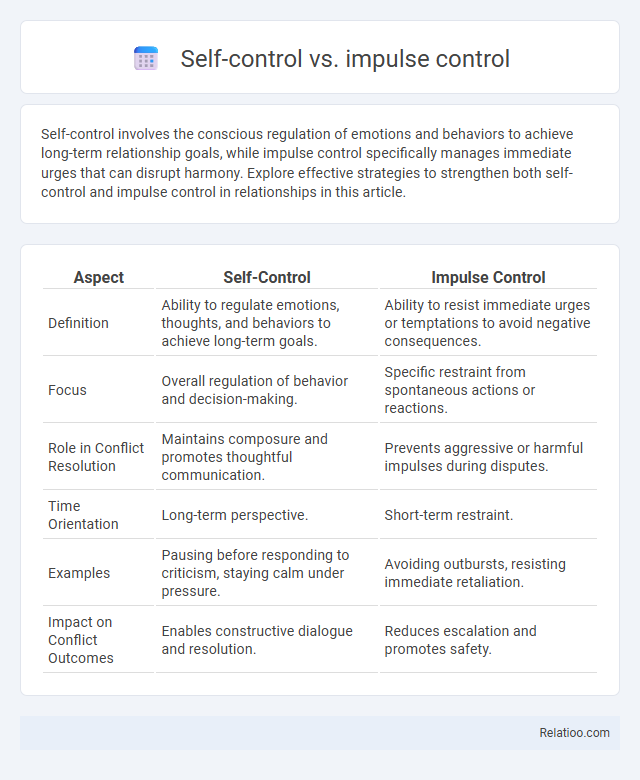Self-control involves the conscious regulation of emotions and behaviors to achieve long-term relationship goals, while impulse control specifically manages immediate urges that can disrupt harmony. Explore effective strategies to strengthen both self-control and impulse control in relationships in this article.
Table of Comparison
| Aspect | Self-Control | Impulse Control |
|---|---|---|
| Definition | Ability to regulate emotions, thoughts, and behaviors to achieve long-term goals. | Ability to resist immediate urges or temptations to avoid negative consequences. |
| Focus | Overall regulation of behavior and decision-making. | Specific restraint from spontaneous actions or reactions. |
| Role in Conflict Resolution | Maintains composure and promotes thoughtful communication. | Prevents aggressive or harmful impulses during disputes. |
| Time Orientation | Long-term perspective. | Short-term restraint. |
| Examples | Pausing before responding to criticism, staying calm under pressure. | Avoiding outbursts, resisting immediate retaliation. |
| Impact on Conflict Outcomes | Enables constructive dialogue and resolution. | Reduces escalation and promotes safety. |
Understanding Self-Control: Definition and Importance
Self-control is the ability to regulate one's emotions, thoughts, and behaviors in the face of temptations and impulses, ensuring actions align with long-term goals. Impulse control, a subset of self-control, specifically addresses the capacity to resist short-term urges or immediate reactions that may be harmful or counterproductive. Understanding self-control is crucial for personal development, mental health, and achieving success, as it influences decision-making, stress management, and the capacity to maintain focus and discipline.
What is Impulse Control? Key Differences Explained
Impulse control refers to the ability to resist sudden urges or temptations that may lead to negative outcomes, distinguishing it from broader self-control, which encompasses managing emotions, behaviors, and long-term goals. The key difference lies in impulse control's emphasis on immediate reactions, while self-control includes strategic regulation over time. Understanding your impulse control helps improve decision-making by preventing rash actions and fostering thoughtful responses.
Neuroscience Behind Self-Control and Impulse Control
Self-control and impulse control are closely linked functions regulated by the prefrontal cortex, a brain region responsible for decision-making, planning, and regulating emotional responses. Neuroscientific studies reveal that effective self-control depends on the strength and connectivity of neural circuits involving the prefrontal cortex and the limbic system, which processes reward and motivation. Impulse control specifically involves the suppression of automatic or reflexive behaviors, highlighting its reliance on inhibitory neurotransmitters like GABA and executive functions mediated by the dorsolateral prefrontal cortex.
The Role of Emotions in Self-Restraint
Emotions play a crucial role in differentiating self-control, impulse control, and self-restraint by influencing how your brain processes desires and reactions. Self-control involves managing emotions to make deliberate choices aligned with long-term goals, while impulse control focuses on suppressing immediate emotional urges. Self-restraint combines these aspects by consciously regulating emotional responses to maintain behavior consistent with personal values and societal norms.
Everyday Examples: Self-Control vs. Impulse Control
Self-control involves consciously regulating your actions and emotions to achieve long-term goals, such as resisting the urge to check your phone while working. Impulse control refers to the immediate ability to suppress spontaneous reactions, like not grabbing a snack when you're not hungry. Everyday examples highlight that self-control is a broader, deliberate process, whereas impulse control manages momentary urges impacting daily decisions.
Common Triggers Leading to Loss of Control
Common triggers leading to loss of control in self-control, impulse control, and self-regulation include stress, emotional upheaval, and environmental cues such as social pressure or tempting stimuli. These triggers can overwhelm cognitive resources, impairing the prefrontal cortex's ability to inhibit automatic responses and promote goal-directed behavior. Understanding these triggers helps in developing strategies like mindfulness and cognitive restructuring to enhance overall self-regulation and reduce impulsive actions.
Strategies to Strengthen Self-Control
Strengthening self-control involves techniques such as setting clear goals, practicing mindfulness, and developing healthy habits to resist impulsive behaviors. Impulse control specifically targets immediate reactions through delay strategies like deep breathing and distraction to reduce automatic responses. Consistently applying cognitive-behavioral methods enhances overall self-regulation, improving decision-making and emotional resilience.
Techniques for Improving Impulse Management
Techniques for improving impulse management include mindfulness meditation, cognitive-behavioral strategies, and delay tactics that help individuals recognize and regulate immediate urges effectively. Practicing self-monitoring and setting clear goals enhances neural pathways associated with self-control, increasing overall impulse regulation capacity. Habit formation through consistent routine adjustments and environmental modifications also supports sustained impulse control improvements over time.
Self-Control and Impulse Control in Decision Making
Self-control and impulse control are critical components in decision-making, with self-control representing the broader ability to regulate emotions, thoughts, and behaviors to achieve long-term goals, while impulse control specifically targets the suppression of immediate urges or temptations. Your capacity for effective decision-making improves as self-control strengthens, enabling you to weigh consequences and resist impulsive actions that may jeopardize desired outcomes. Research in cognitive psychology highlights that enhancing impulse control directly supports better self-regulation and rational choices under pressure.
Long-Term Benefits of Developing Both Skills
Developing both self-control and impulse control enhances your ability to make deliberate decisions that align with long-term goals, improving emotional regulation and reducing impulsive behaviors that can lead to negative consequences. Self-control involves sustained effort over time, while impulse control targets immediate reactions, and strengthening both results in better stress management, healthier habits, and increased resilience. Prioritizing these skills supports consistent progress toward personal and professional success, maximizing overall well-being.

Infographic: Self-control vs Impulse Control
 relatioo.com
relatioo.com